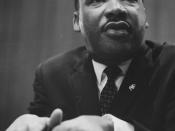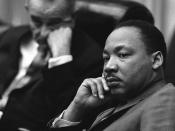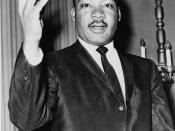Martin Luther King, Jr., in his famous Letter from the Birmingham Jail, responds forcefully yet politely to a public statement made by eight Alabama clergymen in 1963. He defends his position as an African American and strongly defends racial equality, referencing countless sources and utilizing several literary devices. Most significantly, King uses frequent Biblical allusions and metaphors, not only to relate to the Clergymen and the people of Alabama, but also to display his passion for equality. For instance, when he speaks of just and unjust laws, he references the reasoning of Saint Thomas Aquinas, "To put in the words of Saint Thomas Aquinas, an unjust law is a human law that is not rooted in eternal and natural law. Any law that uplifts human personality is just. Any laws that degrades human personality is unjust"(King 180). King cites the book of Daniel when he discusses Shadrach, Meshach, and Abednego and the disobedience of a law for higher moral principle.
King also relates himself to the Apostle Paul and his thriving effort to assist the men and women who call for his aid. After much further research I have gained new insight in why King used these metaphors as he did. Outside sources have helped me analyze the deeper meaning behind the allusions and understand the changes King was hoping to impose on the public and the Clergymen. King's ideals are supported with his immense knowledge of the Bible, which make his connections extremely credible.
King opens his letter by connecting himself with the Apostle Paul in an attempt to better associate with the Clergymen. "Just as the prophets of the eighth century B.C. left their villages and carried their "thus saith the Lord" far beyond the boundaries of their home towns, and just as the Apostle...


